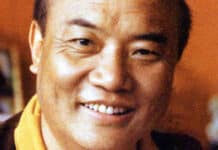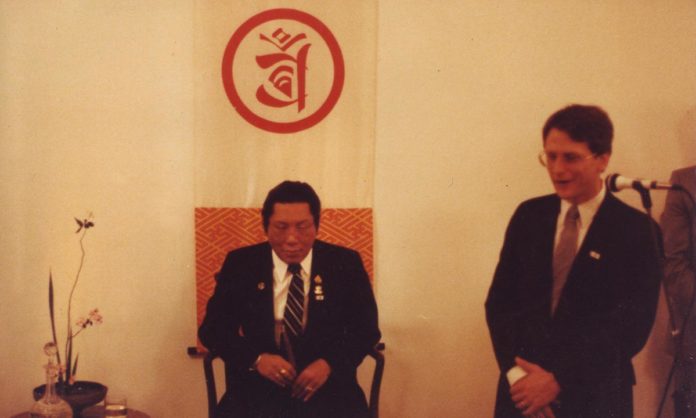
Elocution lessons with Trungpa Rinpoche
Soon after arriving in India in 1960, Chögyam Trungpa Rinpoche began to study English with the help of Freda Bedi and later John Driver, both English. During his years at Oxford University (1963-1967) he developed a deep appreciation for the English language and was perhaps the first Tibetan to master its subtleties and idioms. While most English speaking Tibetans have Indian accents, Trungpa Rinpoche spoke with a distinctive British accent. He would often admonish his North American students to enunciate their words and to “speak properly.”
Starting in 1983, he formalized the practice of elocution by composing a series of elocution exercises. During the last several years of his life, elocution became an important aspect of how he worked with students and also how he spent his time. He thoroughly enjoyed reciting elocution exercises and poetry aloud and worked tirelessly to impart his respect for the spoken word to his students.
In the story below, Dan Meade recalls Chögyam Trungpa Rinpoche’s visit to Philadelphia in 1983 and the circumstances leading up to the first elocution exercises. Dan currently divides his time between Halifax, Nova Scotia and London, England.
We’d like to open this topic for discussion. If you are one of the people who received elocution lessons from Trungpa Rinpoche, or if you have any observations or comments about elocution, please let us know. We’d also like to hear from other people who were in Philadelphia during Rinpoche’s visit.
I had been appointed ambassador (or resident teacher) to the Philadelphia Dharmadhatu in 1978 and after years of work I arranged for Rinpoche to be scheduled to visit Philadelphia. Seeing the dates on paper made me so happy and terrified at the same time. I felt like some sea explorer who had found a strange island that my nation had heard about, sent me to investigate and tame, and now the ruling monarch was about to visit. I loved the prospect of him coming and at the same time was pissing in my pants at the thought of being on the spot with him watching.
I knew that I would have to introduce him in public and that thought put a blue electric shot of adrenaline up my spine. We picked him up at the airport and I reached out my hand to help him out of the wheelchair. He rose easily, smiling at me from ear to ear and we immediately went to the Dharmadhatu for his talk. Somehow or other we were wearing matching suits and we walked slowly together up the steps hand in hand. As we reached the top flight, I felt myself turn to dry ice. I knew that I was going to freeze when I walked in the door, and I did. The gaze of all those people was like old-fashioned bulbs flashing at Hollywood stars. I stood before the gathering and mumbled a very brief and inarticulate introduction. As I spoke, I sensed Rinpoche watching me as I slid down the black memories of not being an okay person. It was a terrible speech. There was nowhere to hide. I glanced at Rinpoche: His stern gaze was saying something that I could not grasp. The sweat trickled down my brow and into my eyes.
His talk on the other hand was wonderful and charmed the crowd. We slowly walked back to the car like matching penguins and drove to the residence. As we whizzed through the night highway and city lights he asked me about people in our community; he wanted to know every detail about every man, woman and child. I tried to fill him in on anything that I thought might interest him. As we got out of the car he put his arm around me and told me how proud he was of me. I melted into his embrace like butter on hot toast.
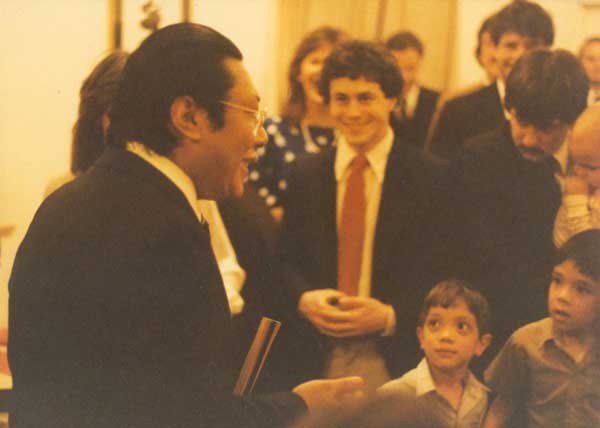
Trungpa Rinpoche meets members of the Philadelphia Dharmadhatu in 1983.
Facing Rinpoche are Michael Baime and Paul Phillips (holding his son Paulie).
Lower right: Aaron (left) and Gampo Wickenheiser.
When we arrived at the door, Rinpoche wanted to see Meera (my wife) before anyone else. She had given birth to our son Alexander a few weeks before and was more than a little preoccupied. Meera came downstairs and Rinpoche was very pleased to see her. As she held her son up for Rinpoche to see, Alexander puked and Meera caught most of it in her hand; the rest somehow missed Rinpoche entirely and landed on my new silk tie. She cupped the liquid in her hands as she asked: “Would you please give him a name?”
“His name is Dorje!” Rinpoche said, his voice spiraling to the roof.
There were many guests waiting with big smiles, food and sake all around. As the evening proceeded everyone was ushered into the elegantly appointed living room. I was like an usher on opening night, making sure that everyone had a good seat and could enjoy the show and meet the star. As the receiving line progressed he would ask me about certain individuals in a quiet sidebar.
A smaller crowd settled in for the evening. I played the host’s role and tried to break the ice with a little small talk. One of my first comments was, “Sir, I think that you are gradually losing your English accent.” He slowly turned his head and eyes towards me like a battleship changing course on the high seas. With a cold stare he said, “What did you say?”
I got the point that he did not appreciate my comment. He then began to compose several poems, or elocution exercises. But first he asked that somebody type the poems as he said the words. There was a scurry as an old manual typewriter was set up in front of Mr. Janowitz, who began to pound on the keys as Rinpoche spoke. Here are two of the elocution exercises that were written that evening.
HOW TO SPEAK THE ENGLISH LANGUAGE
AND HOW NOT TO SPEAK AMERICANISM!
by Chögyam Trungpa
Spider is black,
Sky is blue,
How tantalizing this world.
Kathy’s hair is black,
Her complexion is white,
Her attention is like a bow string.
More than monumental,
More than tattered,
More than dying,
The Liberty Bell is more than antique.
Conglomerates garden party
Is full of the vicissitudes of life.
I feel sorry for the Queen of England.
A tug of war,
Smell fish like the Japanese,
How gorgeous to be a mountain deer.
Be a tiger,
A roamlike tiger.
How fabulous I am.
The Elocution Home Study Course, including an audio cassette of Trungpa Rinpoche’s elocution exercises and an exercise booklet, can be ordered from the Shambhala Shop.
Strafford, PA, 4 May 1983
©2005 Diana J. Mukpo
Presented here with her permission
How to Pronounce Properly!
by Chögyam Trungpa
The British monarch has nothing to say.
The English language is splendid.
We thoroughly serve and subjugate.
Mother will be pleased.
The oak tree sits on the pond with lots of birds on it;
How dare we say otherwise!
Roaming in the orchard is dangerous because autumn trees are armed.
Enjoy a glass of lager and lime, I’m yours.
When each exercise was finished and Rinpoche had read it aloud several times himself, he asked each of us to repeat the exercise with the proper inflection, pronunciation and meter. We went in turn, clockwise around the room, over and over with Rinpoche’s countless corrections. When we erred, he would stop us in mid-breath and recite the poem himself with demonstrative hand and vocal sweeps through the early morning air. The birds in the surrounding trees agreed.
I was still embarrassed by my awkward introduction earlier in the evening and hearing his high sweet voice in that accent soothed me. It was nice to hear some well-spoken English in any accent that night, to tell the truth. But eventually, I got impatient and tried to politely excuse myself from what had become a little too much English and not enough sleep. Rinpoche’s response was non-verbal; he only raised his eyebrows. I stayed and so did everyone else, repeating the English mantra-poem again and again. That was the first night and morning.
Sometime in the late afternoon I was awakened and requested to enter Rinpoche’s room to discuss the schedule with him. It was like entering the den of a very large black bear and I was the local Cub Scout leader. I was happy and proud to have the job, but no matter what I proposed, the response was “manana.” He seemed endlessly content to wait and see what might unfold around him. There was never a rush or push to make something happen.
I had heard that Rinpoche was fond of the paintings of Turner, especially his three paintings of Parliament burning. One of these paintings is in London and Rinpoche had seen it many times. Another was in Philadelphia, and I have no idea where the other one is.* After many phone calls and much effort, the museum invited Rinpoche to a private viewing of the Turner exhibit and the museum as a whole.
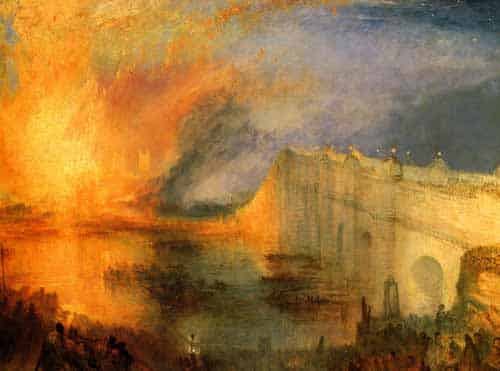
Turner’s three paintings of this scene are in the Philadelphia Museum of Art, the Tate Gallery in London, and the Cleveland Museum of Art. Thanks to astute reader Stephen Briody of London for passing this information on.
The evening before the showing I informed Rinpoche of the next day’s schedule and told him how much effort had gone into it and how many important people would be there. He rolled over in his bed and said nothing. I was a bit anxious about that reply. The next morning he was woken at the appropriate time for what might be a slow rising of the sun. We had to slowly bring up the issue of actually getting dressed and going to the museum. The time for departure approached and slipped away. Official apologies were made to the museum muckety mucks and we rescheduled for the next day….and the next….until one morning I was afraid the woman who had spearheaded the project was going to commit suicide. I blew the whistle on the adventure and said sorry to all involved. Then someone had a good idea: We purchased a book of the museum’s paintings, cut out the prints, and pasted them all over the rooms and hallways in the house. Eventually, Rinpoche roused himself out of bed and walked slowly through our ad hoc museum. We all had a good laugh.
Later during the visit, Rinpoche make a very brief visit to the Liberty Bell. We emerged from cars like most tourists, but our party was given space. As Rinpoche walked slowly through the crowd, people just simply moved out of the way. It’s traditional for visitors to touch the Liberty Bell as a sign of respect and admiration. Rinpoche just looked at the bell briefly and left.
On the second night, Rinpoche suggested that we continue with what he now called elocution lessons. He composed new exercises, as Mr. Janowitz banged away at the keys. Rinpoche read them over and over, stressing the Oxonian pronunciation of each and every syllable. His black hair was gleaming and his eyes were happy.
Night Three: The elocution lessons continued endlessly….Kathy’s hair is black….on and on and on. It was amusing the first two nights, but now it was beginning to make everyone nervous, impatient and of course no one had the nerve to ask him about it. Since I was the host, I thought that it would be good if I asked what he was doing
“Is there a point here?” I asked.
At first, Rinpoche said nothing back to my questions. It was like looking into an endless mirror with no reflection. There was a very long pause. When it came, his answer was to the point: “People need to know how to speak properly! Properly! That is why I am doing this!” I felt like crying. His voice was high pitched and like an arrow.
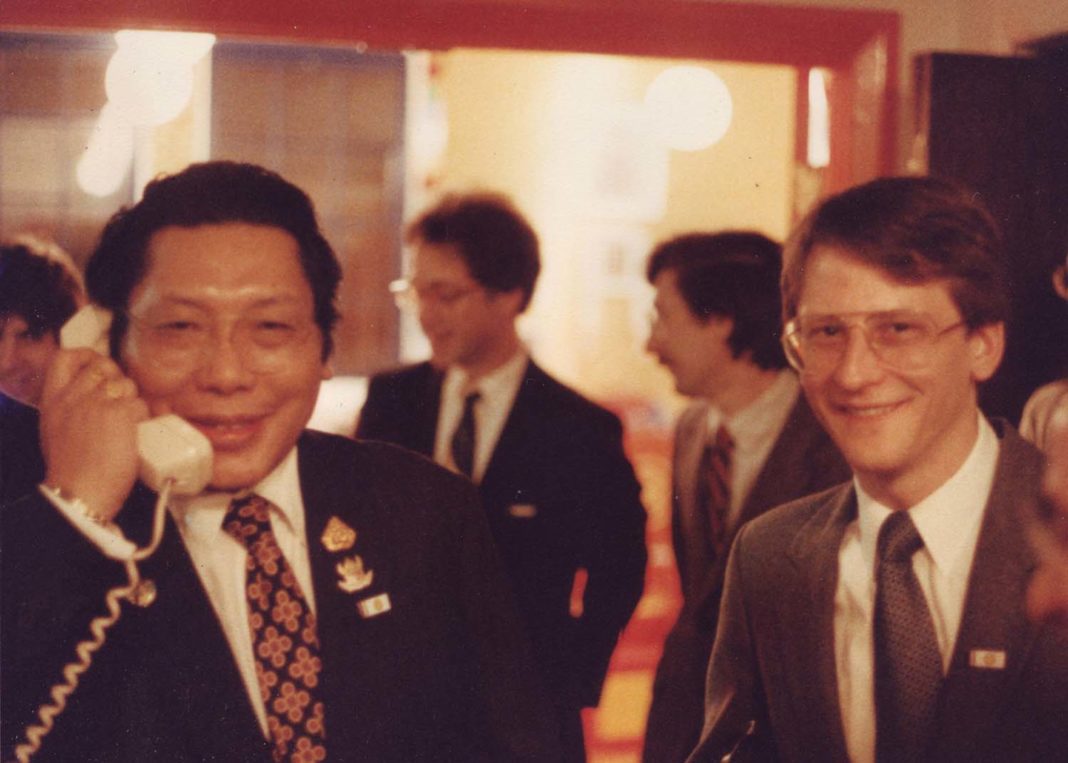
Trungpa Rinpoche and Dan Meade at the Philadelphia Dharmadhatu in May 1983. Rinpoche is talking to his wife, Lady Diana.
The visit ended and Rinpoche said goodbye to Philadelphia. Although I never tried it again, elocution became a tradition, an ongoing aspect of Rinpoche’s milieu. I have to say that it was never my cup of tea, but what I witnessed during that visit was another amazing manifestation of his caring for people. He had eighty-four thousand dharmas up his sleeve and would pull out an ace whenever anyone needed one for their hand.
On the last night, he composed the poem below.
©2005 by Dan Meade
Conquering Middle America
with the Sound of One Finger Snap
by Chögyam Trungpa
As the orange sun glows
The crescent moon sets
Blackbirds play their tune
Owls are vanished
Our horses are beginning to stand up
in the appreciation of the dawn.
I sat with friends throughout the whole night
After last night’s proclamation,
Blackbirds are beginning to fly around
Mosquitoes have not woken up yet
I think of my wife who is on the frontier,
Fighting this endless war
I am disturbed that she decided to adopt six tiger cubs
But then she is born as warrior
What can I say?
Through her ladies-in-waiting,
I heard she had developed this idea of domesticating
 five hundred coyotes and jackals
five hundred coyotes and jackals
Sometimes husbands and wives have conflicts
But in my case I give in
I let her have freedom to do whatever she wants to do
The only thing I object to is raising Arabian horses
If she wants to flood our land with lots of horses
 I have no objection
I have no objection
As long as she doesn’t breed any cats
The Mukpos are known to hate cats
Love tigers
Appreciate jackals
Heaven and earth begin to join
We begin to speak good Aryan language
We begin to burp in the extraordinary sense.
Cherry blossoms begin to chirp
Raccoons perk up their ears
Philadelphia Dharmadhatu is beginning to appreciate
 Yumtso
Yumtso
Dharma begins to flourish as much as Niagara Falls
with a rainbow over it
Meek Meades begin to fly in a hang-glider which is
 unheard of
unheard of
Frontier campaign is stupid and harsh
I am so glad to see the beginning and end of American
 Independence
Independence
by witnessing the Liberty Bell
I am totally flabbergasted that Liberty, Fraternity
 and Egality
and Egality
Can be seen purely by one afternoon’s trip into the town
But I am so relieved that egality is letting people smile
I am so overjoyed that fraternity is that nobody fights
 for potential sanity
for potential sanity
I am very cheerful that liberty could be non-aggression
Thanks to the lineage, Rigden Fathers and basic sanity,
 I have conquered
I have conquered
and am able to touch what is known as the sore point
 of the nation’s pride
of the nation’s pride
And the nation’s wound, known as freedom, could be cured
 by medical aid
by medical aid
known as Vajradhatu band-aid
Hopefully, America could be healed
And hopefully, Liberty Bell could be proclaimed without sore spot.
Once, there was a Shambhala man who called himself
 Agent to the Sun
Agent to the Sun
He applied an emergency bandage to the bleeding
 setting-sun gash
setting-sun gash
Then the final healing took place, after six months
But we had to feed this patient with liquor known
 as Meade
as Meade
The gentleman will cure and heal on the spot after six months.
By Meade or means without going to various museums, I have discovered Mona Lisa on the spot, the burning of London without panicking on the spot. I have seen the portrait of the Fire of London by Turner more than fifteen times. So, my visit to Philadelphia has become successful, passionate and organic. I would like to dedicate this poetry to the exotic drink known as Meade.
©2005 Diana J. Mukpo
Presented here with her permission
Remarks on Elocution from Trungpa Rinpoche
Language is language. If there were no human beings, there wouldn’t be language. Each word that we speak should be regarded as a gem. When we speak or talk, we should regard words as tangible rather than as pure sound.
If you are talking to a bank manager or a lawyer, they will believe you if you speak properly. If a policeman is about to give you a speeding ticket, if you speak to him properly, he might not give you a ticket! (Laughter)
Language is our human heritage. Other creatures bark or neigh, but we have a very special gift known as language. So language is a very important gift that human beings have developed. Thank you.
CTR, 21 January 1984.
Remarks to the Karma Dzong Community in Boulder.
©2005 Diana J. Mukpo
A call for comments
We’d like to open this topic for discussion. If you are one of the people who received elocution lessons from Trungpa Rinpoche, or if you have any observations or comments about elocution, please let us know. We’d also like to hear from other people who were in Philadelphia during Rinpoche’s visit. What do you recall about these events?
Comments
Dear Chronicles,
Thank you for featuring Dan Meade’s personal recollections of the Vidyadhara’s 1983 visit to Philadelphia. For what it is worth, I would like to share one of my memories from that time with you.
I went with VACT as his personal guard on the trip to the Liberty Bell. If you have never been to Philadelphia, then it is worth noting that the Bell resides downtown in a glass pavilion in the middle of several city blocks’ worth of national park. It is right across the street from Independence Hall, in the middle of Center City. We were welcomed into the Bell Pavilion at its east entrance by a lone national park guard, who wore a great hat of the variety much favored by Smokie the Bear. Smokie escorted our small party up to the velvet rope that encloses the Bell’s space. He then stepped back, so we could step up.
I was standing right next to Rinpoche as he let his touch linger on the deep crack in the Bell. Time slowed. The eyes in his round moon-like face became deeply thoughtful, like Avalokiteshvara gazing upon planet Earth in its global woe. With that touch, it seemed to me that VACT was sampling the entire sweep of our nation’s mythological experiment with freedom, delivered at the shameful cost of African slavery and Native genocide. Someone spoke, and time moved again. “Well, Sir, what do you think of the Liberty Bell”, asked a member of the party.
VACT spoke: “Liberty Bell not all it’s cracked up to be!”
We had a good giddy laugh with that one. But the story would be incomplete without one more punchline. We exited the west side of the pavilion and stepped into the May sunshine. Across the greensward, we spied a band of Vietnamese monks making their approach to the Bell (more US history!). They saw the Vidyadhara, who was sporting a uniform which I can only describe as perhaps a shark-blue Nehru ensemble. On his shoulders were discrete Velcro tabs, where he had removed his gold epaulettes the night before. Twenty-two years later, I still wonder what the monks thought of all this. They smiled shyly at our party. One monk returned our wave. A woman in our little group gaily offered to VACT, “Oh, look, Sir! A party of monks from VietNam! Should we send some kasung to capture them?”
To which he replied, smiling with obvious relish, “Yes, by all means. . .before they have time to set fire to themselves!!!”
Yours truly,
John Crowe
PS: BTW, on the matter of elocution, I would be most remiss if I did not point out that the resident pronunciation of Philadelphia is actually ‘Fluffyla.’
tingdzinkochu@earthlink.net
Here’s a story from the 1983 Philadelphia visit. It’s a little discreditable to me personally, but it was the occasion of my only lengthy chat with the Vidyadhara, so I have fond memories of it in spite of my embarassment about the circumstances. I was a member of the D.C. Dharmadhatu at the time, and a small group of us drove up to Philadelphia for the visit. Following Rinpoche’s talk on the evening of his arrival, people formed a line to go up and say hi and receive his blessings, and as people got more and more involved in their conversations with him, the line began to move more and more slowly. Dan Meade became concerned about this and announced that, because of schedule pressures, he would have to stop the line altogether if it couldn’t keep moving smoothly. When I finally knelt in front of Rinpoche, all I could suddenly think to say to him was how much I wanted to pursue my study of the Tibetan language and join the Nalanda Translation Committee. I thought that he would probably give me some quick word of approval, smile, and wave me on, but he became extremely interested and asked me what I thought of The Life of Marpa, which had just been published. This then turned into a conversation of at least a minute in which he asked me when I was going to Seminary and invited me to sit in on sessions of the Nalanda Committee’s work. I was deeply, deeply appreciative of the chance to have this kind of exchange with the Vidyadhara, but I was also very anxious for the people following me in line who might now not have a chance to talk to him. As I feared would happen, Dan Meade announced the closing of the line as soon as I got up, and none of those folks had a chance to touch in–at least not on that night.
Rick Finney




